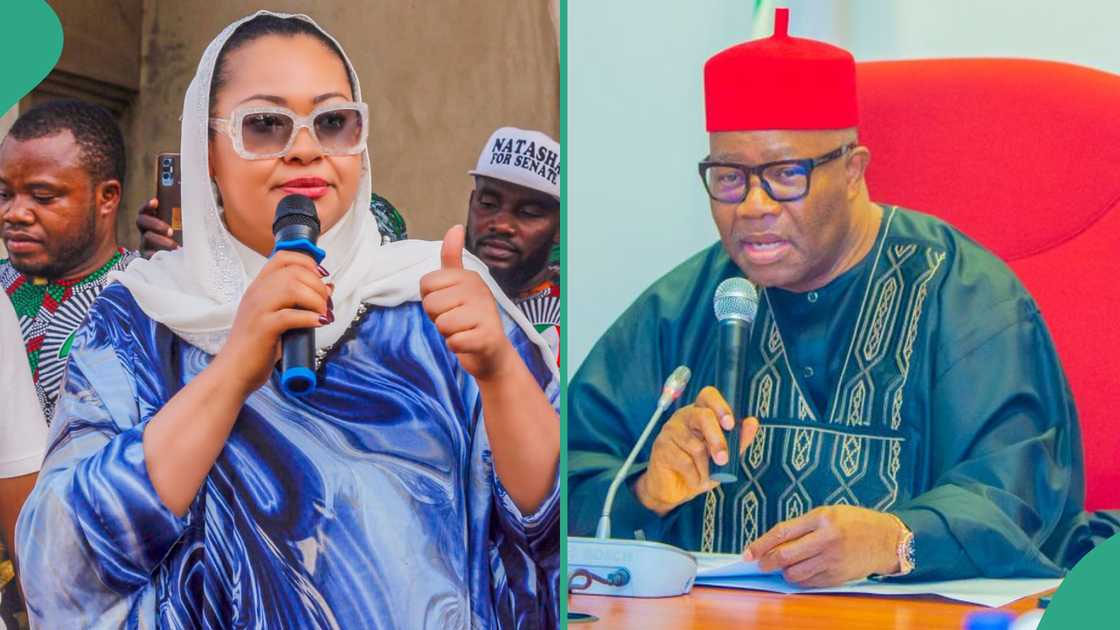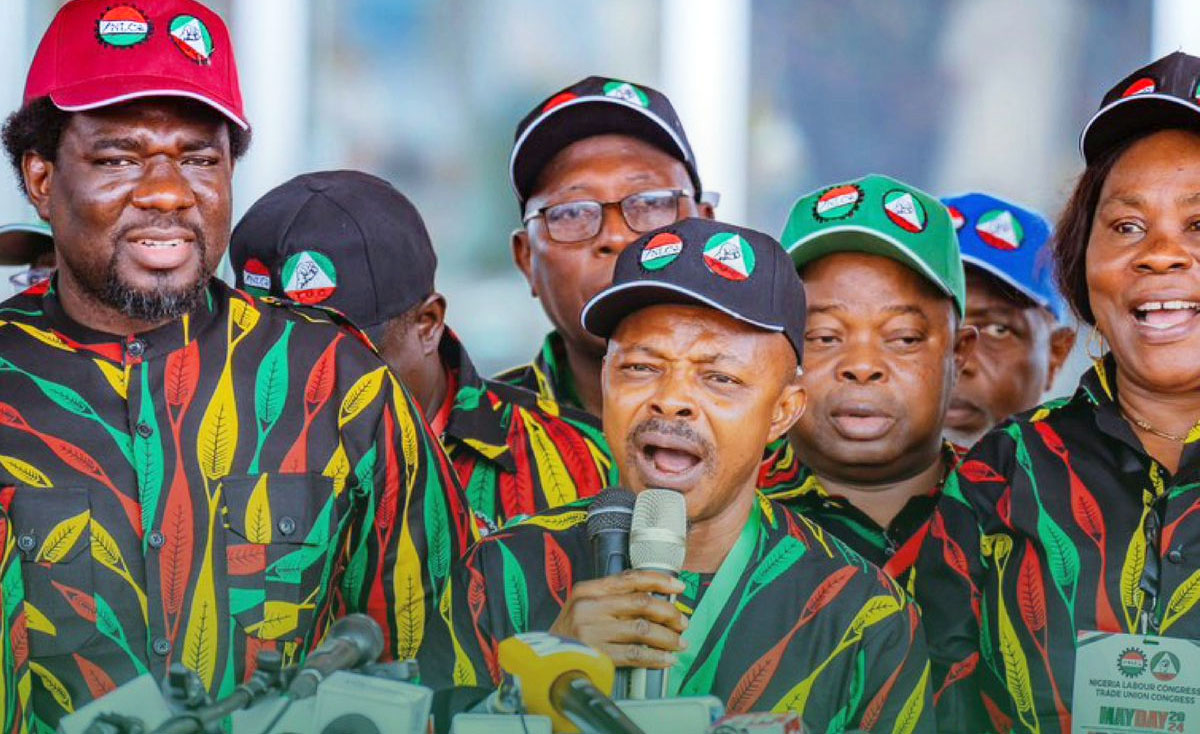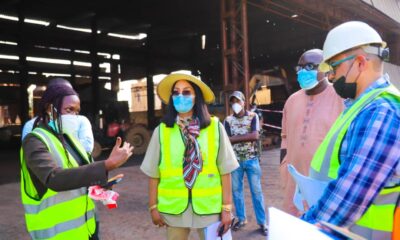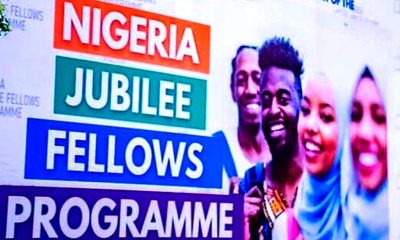News
Jobs: FG begins six-month free IT training for two million youths

Jobs: FG begins six-month free IT training for two million youths
The Federal Government is set to offer six months of free training to youths to fill two million job vacancies.
President Bola Ahmed Tinubu has also approved N120 billion to revive technical education.
Minister of Education, Dr Tunji Alausa, spoke during the third Ministerial Press Briefing, organised by Minister of Information and National Orientation Mohammed Idris in Abuja.
Minister of Aviation and Aerospace Development, Festus Keyamo, also gave an account of his stewardship.
Alausa said: “We have almost N120 billion and the President has approved it for us to move this agenda forward.
“This programme will be launched probably in the month of May.
“Today, based on UNESCO data, there are 650,000 vacancies in software development methodologies, about 280,000 vacancies in cyber security, and about 160,000 vacancies in IT automation.
“Another 150,000 vacancies in AI and machine learning, about 120,000 vacancies in cloud computing, and about 60,000 vacancies worldwide in national language processing.
“Add that together, we have almost two million job vacancies out there.
“So, what we’re doing with Digital Training Academy is working with trainers that will offer six- months of training to young engineers.
“We, as a government, will pay for their internet services, pay for their certification- Cisco certification, End of Career certification, and Google certification.”
Alausa said the strategy would give Nigerians new digital skills needed to stand out in the world.
He added that the training would be launched on or before June.
READ ALSO:
- Customs seize $1.15m, SR135,900 (Saudi Riyals) at Kano airport
- US court to Trump: Return workers fired across agencies
- Blackout: Ikeja DISCO restores power at Air Force Base
The minister said the Federal Ministry of Education was putting measures to encourage Science, Technology, Engineering and Mathematics (STEM) to meet the areas of needs.
He said this would be done through the Digital Training Academy (DTA) to give students skills in service industries.
Alausa reiterated the commitment of the government to return 10 million out-of-school children to the classrooms.
He said the ministry was working on a new strategy to increase access, improve quality and enhance education systems for foundational learning.
Alausa said between now and 2027, the government will reconstruct 195,000 classrooms across the nation.
“With regards to infrastructure, between now and 2027, we will need to raise 195,000 classrooms across the nation.
“We will install 28,000 toilets, and 22,900 boreholes across other schools in the country.
“We will construct about 7,000 new classrooms and provide learning and teaching materials by organising 103 million textbooks,” he said.
Alausa hinged the current proliferation of universities on the increasing pressure being mounted by lawmakers.
He said almost 200 bills were pending in the National Assembly for the creation of universities.
Alausa explained that renewing the capacities of existing institutions was more important than establishing new ones.
According to him, there is no need to put pressure on the president to establish new universities.
“We must focus on our capacities. We need to stop this from happening. There’s so much pressure on the president.
“We have to at least be sensitive to it as well. They (lawmakers) are passing a lot of bills.
“Today, there are almost 200 bills in the National Assembly. We can’t continue this.
“Even though we have a lot of them, the capacity for a university to admit is not there.
“What we need to do now is to rebuild the capacities so that we can offer more viable courses to our citizens,” he said.
The minister added that the enrollment rate was not commensurate with the recent number of universities.
“If you look at the entire enrollment together, the one per cent of private universities account for just 7.5 per cent of total undergraduate enrollment.
“The total number of undergraduate enrollment today is just about 875,000, which is at least fairly low.
“We have universities with less than 1,000 undergraduate students, and there’s this intense demand for more universities to be opened.
“We have to stop that,” he said.
He added that several key proposals had been put forward to address education sector challenges.
He added that the Tinubu Administration has committed N40 billion to the abandoned National Library of Nigeria project.
READ ALSO:
- Natahsha’s apoti is not godswill for Apkabio
- Witness speaks on Super cop Abba Kyari’s N200m in 10 bank accounts
- EFCC arraigns couple for N197m fraud, impersonating Katsina first lady
The minister said work on the library project would soon commence, adding that this would support academic and research needs.
Others who attended the briefing include Special Adviser on Information and Strategy to the President, Mr. Bayo Onanuga; Special Adviser on Public Communication and Orientation, Mr. Sunday Dare, and Senior Special Assistant to the President on Media, Publicity and Special Duties, Mr. Tunde Rahaman.
Heads of agencies in the Ministry of Information and National Orientation – News Agency of Nigeria (NAN), Nigerian Television Authority (NTA), Voice of Nigeria (VON), National Orientation Agency (NOA) and Federal Radio Cooperation of Nigeria (FRCN) – were also there.
Also at the briefing yesterday, Minister of Aviation and Aerospace Development, Festus Keyamo (SAN), said a drop in airfares was likely soon.
He also said the Federal Government would roll out measures to curb illegal charter operations.
According to Keyamo, the government lost billions of naira to the illegal charter operations which date back 40 years.
Part of the reforms is to mandate regulators to publish the names of airlines that are approved to fly, and proper documentation of those on board the chartered flights.
He also said the control tower would not clear any flight for takeoff without proper identification of the crew members and passengers.
On the high cost of tickets, Keyamo said: “We have domestic tickets and we have international tickets.
READ ALSO:
- How Natasha can get her Senate suspension reversed – Akpabio
- Dangote gives 10kg rice each to one million Nigerians
- Putin gives conditions for Ukraine ceasefire
“I talked about domestic tickets and the fact that we don’t have access to lease aircraft at very cheap costs.
“We only can go for the very expensive option of leasing aircraft or buying aircraft.
“We are addressing that and we are going to see results very soon with the Cape Town Convention and the Dublin Conference we went to.
“The deals are coming in, so we’ll see results there.
“But the international flights, one of the major reasons they used to give is that their monies were trapped in Nigeria.
“When we came to office, there were airlines that had a three-year backlog of funds trapped in Nigeria.
“When their agents sell tickets in naira, it is evacuated and dropped in the CBN, which will get the dollar equivalent and repatriate.
“That is how it is done so that the tickets will be sold in naira.
“So all of these tickets were sold in naira for three years plus, but the CBN had no liquidity, no dollar equivalent to send to these foreign airlines. So the funds were trapped.
“Because of the deft policies of this government on the withdrawal of subsidy and floating of naira, liquidity began to rise and that’s why I was thanking the President for the unusual attention he paid to aviation.”
As part of measures to boost the economy of the country and encourage local operators, the minister said plans are ongoing to introduce the FlyNigeria Act initiative.
“The Fly Nigeria Act will mandate the prioritisation of Nigerian flag carriers for government-funded travel, a bold move to support local airlines and stimulate economic growth.
“We have 13 active private airlines in Nigeria and there is a need to support local airlines by making policies to support their growth,” he said.
Jobs: FG begins six-month free IT training for two million youths
News
Akpabio sues Natasha for ₦200bn over sexual harassment allegations

Akpabio sues Natasha for ₦200bn over sexual harassment allegations
Senate President Godswill Obot Akpabio has instituted a ₦200 billion defamation lawsuit against Senator Natasha Akpoti-Uduaghan, accusing her of spreading malicious sexual harassment allegations that he says have severely damaged his public image.
According to documents filed before the High Court of the Federal Capital Territory, Abuja, Akpabio is seeking substantial damages, public retractions, and nationwide broadcast apologies. He argues that Senator Akpoti-Uduaghan’s televised, radio, and online interviews portrayed him as a sexual predator who abused his office for personal gratification—claims he insists subjected him to widespread ridicule and reputational harm.
The lawsuit includes a comprehensive statement of claims and a list of witnesses. Akpabio is also asking the court to compel the removal of all online materials containing the disputed allegations and to order repeated public apologies across major media outlets.
READ ALSO:
- Nigeria joins global ICH elite as NAFDAC achieves full international regulatory Status
- Supreme Court Strikes Out Osun Suit on Withheld Local Govt Allocations
- DSS Arrests Doctor Providing Medical Support to Bandits in Kwara State
A court order issued on 6 November 2025 granted permission for substituted service through the Clerk of the National Assembly after initial attempts to reach Senator Akpoti-Uduaghan directly were unsuccessful. The case is now moving forward and is expected to become one of the most closely watched political legal battles in Nigeria.
Responding on 5 December 2025, Senator Natasha Akpoti-Uduaghan confirmed receipt of the suit and expressed readiness to defend her allegations before a competent court. She stated that she had previously been prevented from presenting a petition before the Senate Committee on Ethics and Privileges due to claims that a related case was already in court—an action she believes protected the Senate President from legislative scrutiny.
In a strongly worded response, the Kogi Central senator maintained that the court proceedings will finally provide the platform to substantiate her claims. She reiterated her stance that she experienced sexual harassment and that her refusal to comply with the alleged advances prompted sustained political retaliation.
“See you in court, Godswill Akpabio,” she declared.
Akpabio sues Natasha for ₦200bn over sexual harassment allegations
News
NLC threatens nationwide protests as insecurity worsens, withdraws support for Labour Party

NLC threatens nationwide protests as insecurity worsens, withdraws support for Labour Party
The Nigeria Labour Congress (NLC) has warned that it will no longer remain passive as criminal gangs intensify violent attacks across the country, declaring its readiness to hold a national day of mourning and mobilise nationwide protests over the escalating insecurity in Nigeria.
Speaking at the opening of the NLC’s National Executive Council (NEC) meeting in Lagos, NLC President Joe Ajaero said the country was “under siege,” condemning the latest school kidnapping and the reported withdrawal of security personnel before the attack. He demanded a full investigation to expose any possible compromise within the nation’s security architecture.
“The NLC cannot stand idly by and allow criminals to take over our country—never again. We want to know who ordered the withdrawal of security operatives from that school. We will not allow kidnappers and bandits to overrun our nation,” Ajaero said.
READ ALSO:
- Oshiomhole Seeks Tougher Regulation of Fintech Firms After Cyber Fraud Experience
- Boris Johnson Hails Kemi Badenoch as “Future UK Prime Minister” During Visit to Nigeria
- A troubling message from Guinea-Bissau, by Azu Ishiekwene
He stressed that the labour movement would soon announce details of the planned protests and national mourning, insisting the lives of teachers, students and workers were in grave danger. “It is getting out of hand. We can no longer bear this,” he added.
Ajaero also revealed that the NLC had withdrawn its representatives from the Labour Party, accusing them of pursuing personal interests rather than representing workers.
Human rights lawyer Femi Falana, SAN, who addressed the meeting, warned that the country was in “serious trouble” over rising kidnappings and attacks. He rejected calls for foreign military intervention, cautioning that such a move would undermine Nigeria’s sovereignty.
Falana criticised recent statements by former U.S. President Donald Trump, describing them as unacceptable. He urged President Bola Tinubu to take decisive action to protect citizens, saying: “We want to let the world know that we are not a conquered people.”
He called on labour unions, civil society organisations and Nigerians to prepare to resist any further decline in national security.
NLC threatens nationwide protests as insecurity worsens, withdraws support for Labour Party
News
Boris Johnson Hails Kemi Badenoch as “Future UK Prime Minister” During Visit to Nigeria

Boris Johnson Hails Kemi Badenoch as “Future UK Prime Minister” During Visit to Nigeria
Former British Prime Minister Boris Johnson has praised UK Conservative Party leader Kemi Badenoch, describing her as a “future Prime Minister of the United Kingdom” during his visit to Nigeria for the Imo State Economic Summit 2025.
Speaking in Owerri, Imo State, on Thursday, Johnson commended Governor Hope Uzodimma for his efforts to boost economic development and improve security, noting that he felt “perfectly safe” despite earlier warnings about Nigeria’s security situation.
Johnson highlighted the state government’s push to deliver 24-hour electricity, stressing that reliable power and clean, sustainable energy are essential for economic growth as the world moves into an Artificial Intelligence (AI)-driven future.
READ ALSO:
- A troubling message from Guinea-Bissau, by Azu Ishiekwene
- Siyan Oyeweso: Lessons in virtue and vanity
- Court Rules Only Lawyers Can Represent Nnamdi Kanu, Rejects Brother’s Appearance
He also emphasized the strong historical and economic ties between Nigeria and the United Kingdom, praising the exchange of goods, services, and highly skilled professionals between both countries.
In a humorous remark that sparked applause, Johnson said: “We send you former UK prime ministers, and you send us future UK prime ministers in the form of Kemi Badenoch.”
The summit, attended by Vice President Kashim Shettima, former UN Secretary-General Ban Ki-moon, business mogul Aliko Dangote, and other top government and private-sector leaders, focused on strategies to accelerate Imo State’s economic transformation.
Boris Johnson Hails Kemi Badenoch as “Future UK Prime Minister” During Visit to Nigeria
-

 News3 days ago
News3 days agoDefence Minister Unveils New Security Strategy, Orders Troops to Shoot Armed Bandits on Sight
-

 metro3 days ago
metro3 days agoTeam Justice accuses authorities of attempting to exclude Mohbad’s father from DNA test process
-

 metro2 days ago
metro2 days agoSenate Launches Emergency Probe into Widespread Lead Poisoning in Ogijo, Lagos/Ogun
-

 International3 days ago
International3 days agoMeta to Block Under-16s from Instagram, Facebook, Threads ahead of Australia’s World-First Youth Social Media Ban
-

 metro3 days ago
metro3 days agoShocking confession: Boyfriend admits luring FRSC officer, child to death in Osun ritual murder
-

 Sports3 days ago
Sports3 days agoLeeds United Stun Chelsea 3-1 at Elland Road to Climb Out of Relegation Zone
-

 News3 days ago
News3 days agoBREAKING: Tinubu Sends Fresh Ambassadorial Nominations to Senate, Names Ibas, Ita Enang, Dambazau
-

 News3 days ago
News3 days agoEmber-months safety: Carloha, FRSC intensify campaign against distracted driving















